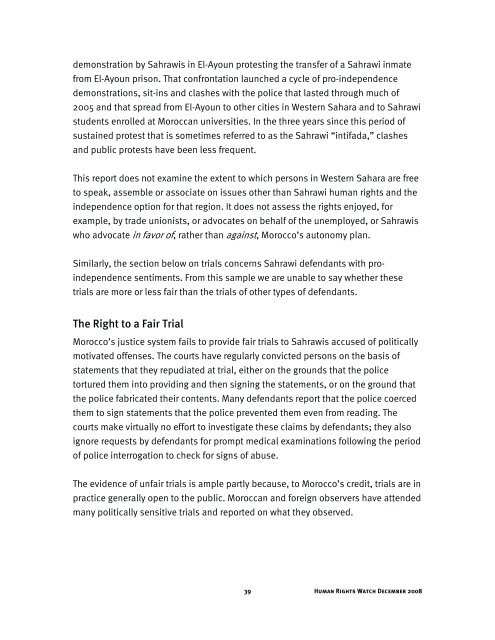Download full report with cover - Human Rights Watch
Download full report with cover - Human Rights Watch
Download full report with cover - Human Rights Watch
Create successful ePaper yourself
Turn your PDF publications into a flip-book with our unique Google optimized e-Paper software.
demonstration by Sahrawis in El-Ayoun protesting the transfer of a Sahrawi inmate<br />
from El-Ayoun prison. That confrontation launched a cycle of pro-independence<br />
demonstrations, sit-ins and clashes <strong>with</strong> the police that lasted through much of<br />
2005 and that spread from El-Ayoun to other cities in Western Sahara and to Sahrawi<br />
students enrolled at Moroccan universities. In the three years since this period of<br />
sustained protest that is sometimes referred to as the Sahrawi “intifada,” clashes<br />
and public protests have been less frequent.<br />
This <strong>report</strong> does not examine the extent to which persons in Western Sahara are free<br />
to speak, assemble or associate on issues other than Sahrawi human rights and the<br />
independence option for that region. It does not assess the rights enjoyed, for<br />
example, by trade unionists, or advocates on behalf of the unemployed, or Sahrawis<br />
who advocate in favor of, rather than against, Morocco’s autonomy plan.<br />
Similarly, the section below on trials concerns Sahrawi defendants <strong>with</strong> proindependence<br />
sentiments. From this sample we are unable to say whether these<br />
trials are more or less fair than the trials of other types of defendants.<br />
The Right to a Fair Trial<br />
Morocco’s justice system fails to provide fair trials to Sahrawis accused of politically<br />
motivated offenses. The courts have regularly convicted persons on the basis of<br />
statements that they repudiated at trial, either on the grounds that the police<br />
tortured them into providing and then signing the statements, or on the ground that<br />
the police fabricated their contents. Many defendants <strong>report</strong> that the police coerced<br />
them to sign statements that the police prevented them even from reading. The<br />
courts make virtually no effort to investigate these claims by defendants; they also<br />
ignore requests by defendants for prompt medical examinations following the period<br />
of police interrogation to check for signs of abuse.<br />
The evidence of unfair trials is ample partly because, to Morocco’s credit, trials are in<br />
practice generally open to the public. Moroccan and foreign observers have attended<br />
many politically sensitive trials and <strong>report</strong>ed on what they observed.<br />
39 <strong>Human</strong> <strong>Rights</strong> <strong>Watch</strong> December 2008


